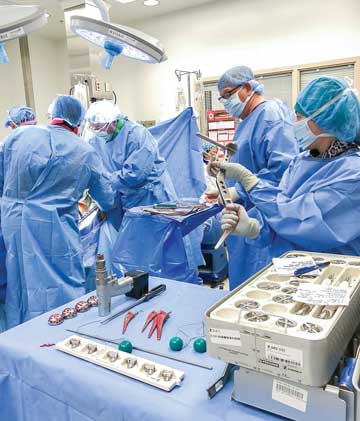S. aureus bacteria found in surgical sites often matches that found in patients' nares. Research has also identified S. aureus in nasal carriages as an independent risk factor of S. aureus infection after joint replacement
surgery.
You can screen patients for S. aureus weeks before their procedures and treat carriers with mupirocin nasal ointment twice a day for 5 days before surgery and vancomycin plus cefazolin for pre-op antibiotic prophylaxis, says Antonia Chen,
MD, MBA, director of research and arthroplasty services at Brigham and Women's Hospital in Boston, Mass. That's a viable option, but outpatient facilities are moving away from screening and instead treating patients for S. aureus,
says Dr. Sporer.
"Patients who undergo joint replacements in the same-day setting tend to be younger, and it's challenging to schedule them for the screening and the follow-up appointments needed to prescribe the nasal antibiotic therapy," he says. "For logistical
reasons, it makes more sense to assume everyone is a carrier when they arrive on the day of surgery, and implement nasal decolonization."
Joanne Epstein, BSN, RN, CNOR, surgical services educator at Saint Francis Hospital in Wilmington, Del., says a lack of compliance with pre-procedure antibiotic regimens is another reason to treat every patient as a carrier of S. aureus.
"Our orthopedic surgeons prescribe intranasal mupirocin to total joint patients," says Ms. Epstein. "And what we have discovered when questioning patients in pre-op is that very few of them use the mupirocin as prescribed."
Nasal decolonization, therefore, "is a good option for outpatient surgery, where you may not get to test everyone and you may not be able to administer pre-operative antibiotics as needed," adds Dr. Chen. There are 2 ways to achieve nasal decolonization:
- Intranasal povidone-iodine. Nurses at Rush Medical Center treat the nares of patients who present for joint replacement surgery with a povidone-iodine nasal solution. The nurses use a total of 4 swabs, 2 per nostril, to swab
surfaces inside the nose for alternating 15-second intervals. The povidone-iodine sticks to the nares and keeps the nose from shedding S. aureus ?for 4 hours.
- Alcohol-based antiseptic. Total joint patients who arrive at Saint Francis Hospital are given a single-use ampule, which they use to swab nasal sanitizer around each nostril — 6 times in counterclockwise and clockwise
directions — an hour before they're wheeled into the OR. The ethanol antiseptic, which reduces bacterial colonization and lasts for several hours, is largely pleasant for patients for use.
Ms. Epstein says a nurse explains to the patient how to use the ethanol-based swab and why nasal decolonization is important, and watches the patient swab to make sure it's done correctly.
"There's no doubt that decolonizing the nose before surgery lowers the risk of infection," says Dr. Sporer, "but there's not yet clear evidence to suggest one method is superior to another."
.svg?sfvrsn=be606e78_3)


.svg?sfvrsn=56b2f850_5)